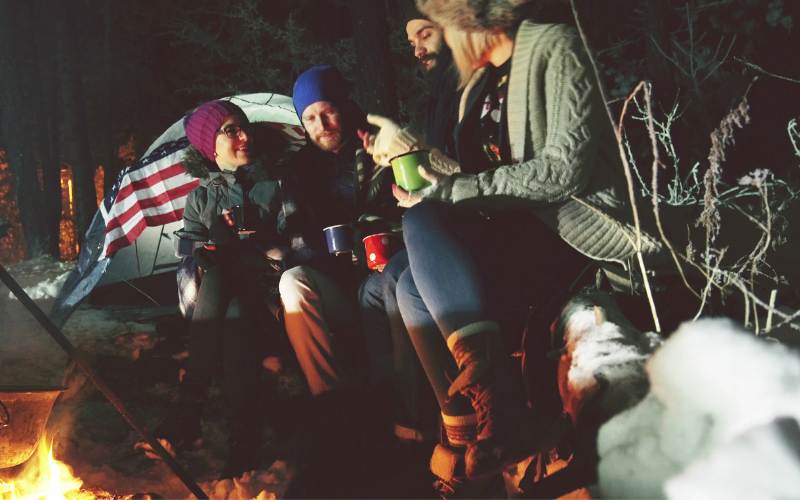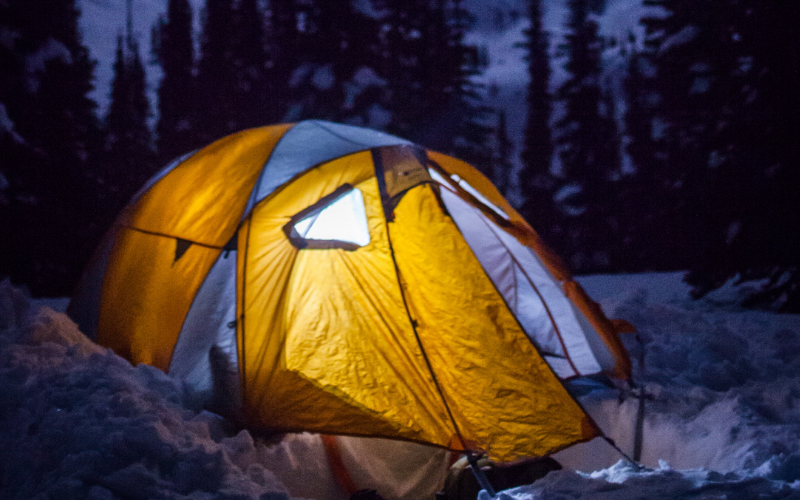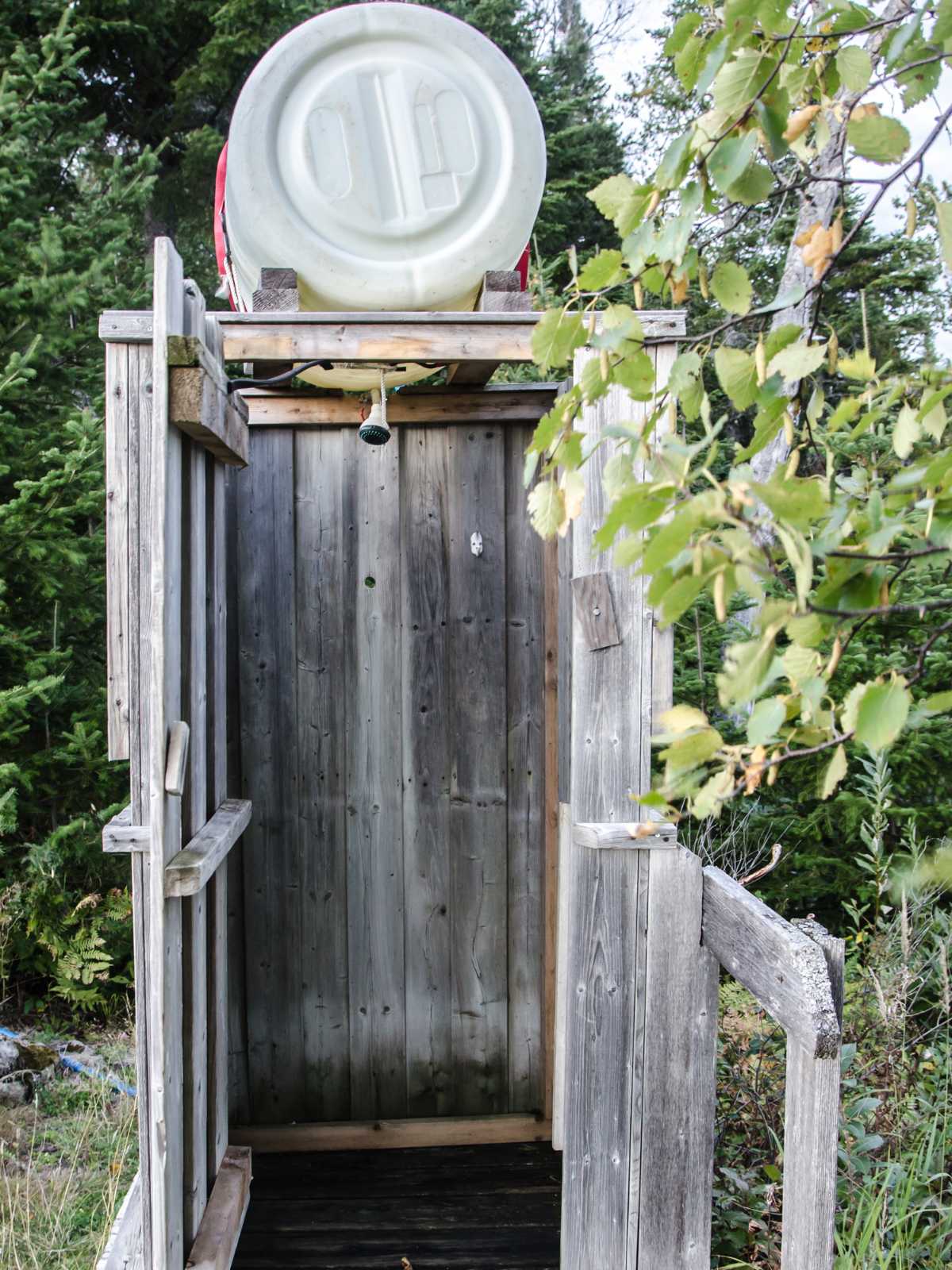* We sometimes use affiliate links, so we may receive a commission, at no cost to you, if you make a purchase through a link. Check our disclosure for more info.
Winter camping takes an extra layer of protection. Literally and figuratively. So, it’s vital to be able to learn how to insulate a tent for Winter Camping.
Yes, we’ve called ourselves pros here. But just because we prefer to head out into the British wilderness with our cubs for more of a family escape, we’ve sure got enough pitches throughout the year to call ourselves pros. Even if it isn’t with some of the more extreme camping locations.
That said, we still have a few tricks, tips and experiences up our sleeves that you can use as learning preparation with tent insulation for cold weather camping. For example, finding out how to insulate a tent for Winter camping VS something else such as a car or Bivvy bag.
Also see:
- The best places to camp in Winter
- Winter camping tips
- How to keep your dog warm when you’re camping
- The best blankets for Winter camping

Can You Insulate A tent For Winter Camping?
You can! And with that, we wanted to answer some of the more regular questions that fly with the cold weather wind before giving you our top ten tips for how to keep a tent warm in the Winter.
Why is Tent Insulation for Cold Weather Camping Important?
Knowing how to keep a tent warm in the Winter is a lifesaving skill that could very well be the difference between a comfortable night’s sleep in the stunning British wilderness to losing your limbs by hypothermia.
It’s quite literally the preventative measures for the ever popular “catch a death of cold” phrase our parents threw at us when we were younger.
That said, it’s worth us saying that modern technology has made the process of learning how to insulate a tent for Winter camping much easier than it ever has been and doesn’t necessarily involve strapping your gear to a mule to carry everything to your wild camping destination.
As well as this, emergency services are just a few clicks away. With 5G towers popping up everywhere, the likelihood of not being able to connect to civilisation again is slim.
Is It Easier to Keep a Tent Warm in the Winter in Multiples?
To answer this question, we’ll first touch on one of the best ways to generate energy and heat: the body. It turns out, the body can expel just as much heat as a 100-Watt bulb on full power.
When you consider a room, the room will take the heat of the items around it. The things able move and/or create some form of energy will be able to generate this heat.
And the more the merrier (if the room size hasn’t also increased, otherwise there’ll be more air to heat-up!).
So, to keep a tent warm in the Winter, you’ll want to have access to as much heat-generating people and things as possible. For example, just you, you and your fluffy camping companion, you and other happy campers or even you and a 100-watt bulb. As we know that generates the same amount of heat as an adult.
That said, if you do take a 100-watt bulb, it’ll need to be turned on with a portable generator and electric hook-up. To learn more about using an electric hook-up, visit our other article so we can take you through it.

How Does the Body Lose Heat?
Now you know that having more people in a room will make it heat up quicker, it’s high time we let you in on how the body is the perfect tool in how to insulate a tent for Winter camping.
There are 4 ways the body loses heat:
Radiation
Heat naturally radiates off the body in cooler temperatures. As the internal body is generally at 37 degrees, any temperature below this will cause the body to lose heat. However, it’s generally when the temperature is sub-20 degrees that the radiation becomes most noticeable.
Evaporation
When there is water on the body (such as sweat or rain), it produces a cooling effect. And, when the water evaporates off the body, it takes around 85% of its overall heat. Interestingly, as we breathe-out micro-droplets, we’re also losing heat there, too.
Convection
Being in the wind, it naturally brushes away body heat. The same is true with a fan. Essentially, when the cooler air is blown onto the skin, it can transplant the heat from the body into other areas such as things you’re touching or the surrounding air. It also contributes to the radiation effect.
Conduction
The final method of heat loss for the body to be useful with tent insulation for cold weather camping is conduction. When the body is in contact with things and elements at a much cooler temperature, the body begins to conduct heat. But this energy is displaced in the colder items, heating them up.

How Can You Reduce Condensation in a Tent?
As you may have guessed, when water droplets are evaporating off the body, they need to have somewhere to go. And, in tent insulation for cold weather camping, there’ll be a level of water-resistance on the tent material.
However, while this can make the tent resistant to taking on heat from the external elements, it also retains any evaporated fluids, too. So, when you manage a cosy night’s sleep, any of your fluids from exhaling or sweating will become a nice coat of condensation on the interior of your tent.
So, we have a few tips to stop the condensation build-up when you keep a tent warm in the Winter:
- Keep any wet or sweaty gear in a separate bag inside the tent
- Wear naturally absorbent materials in your tent
- Don’t breathe into your sleeping bag
- Don’t cook inside your tent
- Unzip your tent to vent at regular intervals
- Wipe any ice and snow off your gear before getting into your tent
- Dry your sleeping bag and clothes in the morning sun
- Take absorbent cloth to wipe the tent walls
- Camp away from water
Is It Colder to Sleep in a Car Than a Tent?
Cars have vents, they retain the heat from the sun during the day and have a pretty thick layer of material to keep you toastie. As well as this, your car should be waterproof; if it’s not, we suggest bringing your MOT or service earlier than scheduled.
With this, it means there isn’t going to be a condensation build-up, you’ll not have to begin in a cold room and there certainly won’t be any wind chill.
So, the answer to the question; ‘Is It Colder to Sleep in a Car Than a Tent?’ is a tent.
That said, there are some obvious downsides to opting for the car instead of getting to grips with how to keep a tent warm in the Winter. For one, you’ll be tempted to turn the heating on which will only result in you feeling the cold more when it’s turned off or running the battery down.
Another reason is that you’ll be in for an uncomfortable night. There isn’t much room to wriggle about, you’ll likely be scrunched up in the back and you can forget about camping with anyone other than yourself!
So, maybe just read on to find out the best ways for how to insulate a tent for Winter camping.

10 Tips on How to Insulate a Tent for Winter Camping
And we’re finally here. You’ve got the best options laid out in front of you and we’ve told you exactly why you should know how to insulate a tent for Winter camping. Now it’s time to walk you through the how:
Pack it with as many blankets as possible
It might be a given, but it’s one of our top tips to keep a tent warm in the Winter. The more space that is taken up in the tent, the less air you need to worry about heating up and keeping warm! Plus, blankets are comfy.
Also see: The best blankets for Winter camping
Line the tent floor
While heat rises, you may not expect to lose your heat into the ground. But considering conduction and the fact that the ground is far cooler than you, you can expect it to steal your heat. So, use a ground mat as a tool for separation.
Add a wind breaker to the mix
There’s no harm in adding another layer between you and the elements when it comes to tent insulation for cold weather camping. They can be full tent covers or simple barriers next to you. But choose the one right for you.
Waterproof everything from tent to covers
Especially the case if you don’t have an all-season tent; you’ll need to add an additional layer of waterproofing as any humidity that can carry moisture, carries heat. And, when it escapes so does your tent’s thermal insulation.
Pitch your tent near natural covers
When we say natural covers, we mean nature’s windbreakers such as cliffs, boulders, trees and so on. You never want to be pitching up in the open unless you really are wild camping on a mountain in Scotland without a choice.
Add a foil coating to the inside of your tent
Foil is notoriously good at maintaining heat levels. Which is why it’s such a staple in the kitchen for any oven goodies. Moving on, a tip for how to insulate a tent for Winter camping is to hang foil on the inside walls of your tent.
Take a tent heater with you
There are hanging ones, seated ones and all sorts out there. You can connect them directly to an electric hook-up at a campsite or to a portable battery. But, for safety, turn them off when you sleep as they can still be a fire hazard.
Use the smallest tent for the number of people camping
The smaller the space, the less air you need to heat up with your many tricks. Also, there’ll be less weight and fewer things to lug around, but that’s besides the point. If you’re alone, maybe even consider a bivvy bag!
Also see: The best tents for family camping
Find yourself reusable hand warmers
You know the ones we mean. You heat them in a pan of boiling water and click the metal cap floating in the centre to activate the heat pack. The more you have, the more conduction heat they’ll let loose into your tent.
Insulate yourself with thermal layers
As we mentioned earlier, there are four ways to expel body heat. Radiation and evaporation being the key ones here. When you’re warmer, you expel more heat through these avenues which, in turn, will insulate your tent.
And there we have our pro’s guide of how to insulate a tent for Winter camping. Of course, there’s no need to hit every single one of our tips for keeping a tent cosy, it’s just a guideline for your best chances at keeping all your toes firmly attached throughout the Winter camping season.










